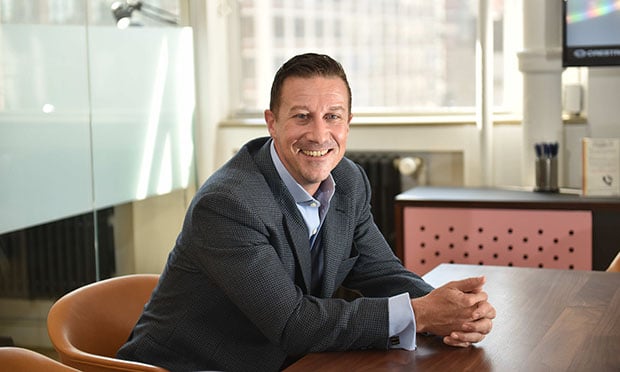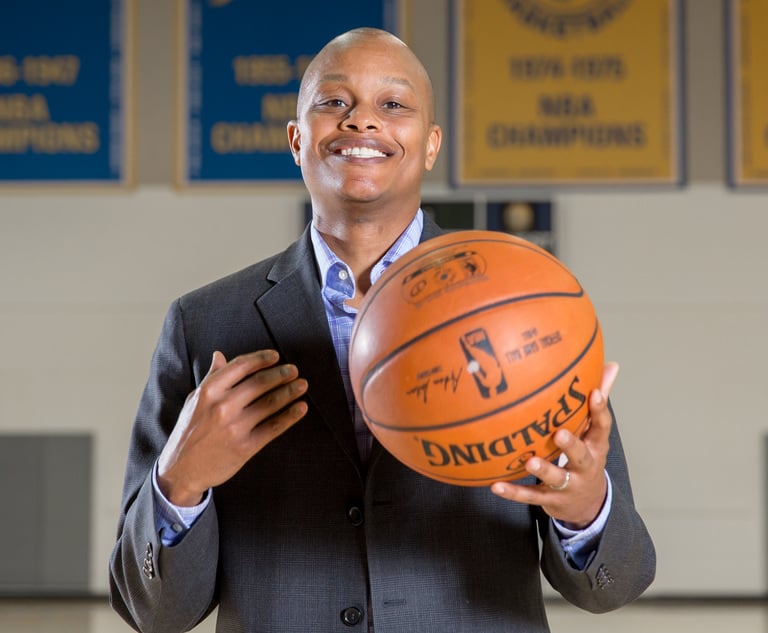Innovator of the Year Finalist: Aaron Crews, Littler Mendelson
"I have the coolest job in the world, because I get to work with amazingly intelligent people who come together to think hard about hard problems," says Crews, one of the legal industry's few c-suite leaders dedicated exclusively to data analytics.
October 28, 2019 at 08:00 AM
5 minute read
 Aaron Crews, general counsel and vice president of strategy at TextIQ, photographed in the firm's Manhattan office Aug. 30, 2017.
Aaron Crews, general counsel and vice president of strategy at TextIQ, photographed in the firm's Manhattan office Aug. 30, 2017.
Aaron Crews, Littler Mendelson's chief data analytics officer, is one of the legal industry's few C-suite leaders dedicated exclusively to data analytics. Part of his work has been to expand Littler's pay equity assessment tool, which takes a data-driven approach to conducting pay equity audits for clients. Crews is among the five finalists for the Innovator of the Year Award. The winner will be announced Nov. 6 as part of the California Leaders in Tech Law and Innovation Awards. The Recorder recently asked Crews what it's like to be a pioneering executive in Big Law.
The Recorder: What does it mean to you to be called an innovator?
Aaron Crews: For me, being called an innovator means my team is killing it in terms of thinking broadly about how we can improve the way we service clients and then executing on those items we choose to pursue.
I have the coolest job in the world, because I get to work with amazingly intelligent people who come together to think hard about hard problems. Our most innovative ideas come from a wide range of sources, including clients talking about their pain points, shareholders and associates across the firm who see something we could do better or more of and have a significant positive impact on clients in the process, members of my immediate team who are constantly trying to discern how we can leverage data to better support our lawyers and clients, and peers like my fellow members of the firm's innovation advisory counsel, including Scott Rechtschaffen (our chief knowledge officer), Paul Weiner (our national e-discovery counsel), Scott Forman (founder of Littler CaseSmart), Lori Brown (CEO of our joint venture with Neota Logic, ComplianceHR), Durgesh Sharma (our CIO), Liz Shannon (our head of application development), and others.
Anyone calling me an innovator should know it's this extended team that brings the magic. I'm just blocking and tackling in the execution of these great ideas. Successful innovation takes a village.
You're among the few law firm c-suite leaders focusing on data analytics. Why do you think Littler embraced the role before others? Do you expect more firms to add analytics experts in the C-suite?
Innovation and being ahead of the curve are really written into Littler's DNA. For the last 75 years, the firm has been a place that puts an emphasis on thinking about the future of work generally, and the future of labor and employment law specifically. In this vein, the firm began investing in data analytics initiatives around 2014. By the time I came back to the firm as CDAO in late 2017, those initial investments had grown and matured to the point where we really needed a holistic strategy around them. The firm's investments in the space, coupled with our culture, helped firm leadership see the need for a c-suite position to consolidate and drive strategy in this area.
In light of the fact that "data is eating the world," I fully expect most other firms will have a CDAO or equivalent in the near future. Our clients are dripping in data, and that data is often "the answer to the test" in litigation, as my partner, Don Myers, likes to say. As a result, the ability to analyze and leverage data to benefit clients is a categorical imperative for lawyers going forward.
At a high level, how does Littler's Pay Equity Assessment tool work? Are there other areas where you're hoping to provide a unique client service through data crunching?
We're always looking for ways we can leverage data to provide unique and impactful client services, and we've got several new tools that will be coming out in 2020. Generally speaking, we try to build tools that add rocket fuel to our lawyer's respective practices or directly resolve pain points identified by our clients.
With respect to the Littler Pay Equity Assessment, the tool analyzes data from a client's HRIS to help identify both the existence and cause of pay disparities within a client's organization.
The tool allows us to run a series of regressions on the client's data in real-time and to visualize it in ways that dramatically improve understanding. It helps our internal pay equity subject matter experts, like my partner Denise Visconti, work in real time with clients, in person or via a video conference, to really understand any pay disparities that may exist, what's driving those disparities, and whether they are legally defensible or require remediation.
This content has been archived. It is available through our partners, LexisNexis® and Bloomberg Law.
To view this content, please continue to their sites.
Not a Lexis Subscriber?
Subscribe Now
Not a Bloomberg Law Subscriber?
Subscribe Now
NOT FOR REPRINT
© 2025 ALM Global, LLC, All Rights Reserved. Request academic re-use from www.copyright.com. All other uses, submit a request to [email protected]. For more information visit Asset & Logo Licensing.
You Might Like
View All
On The Move: Squire Patton Boggs, Akerman Among Four Firms Adding Atlanta Partners
7 minute read
NBA Players Association Finds Its New GC in Warriors Front Office

Eagles or Chiefs? At These Law Firms, Super Bowl Sunday Gets Complicated
3 minute read
Trending Stories
- 1Trade Wars: Five Tips for Legal Teams to Manage Tariffs and Trade in Trump II
- 2Balancing Attorney-Client Privilege With a Lawyer’s Right to Defend Against Allegations of Wrongdoing
- 3Public Interest Calendar of Events
- 4Sharpening Residential Insurance Fraud Defense Strategies: Insights for Insurers to Mitigate Risk in 2025
- 5Reversal of Fortune: Restoring Owners’ Equity Under New Jersey’s Tax Sale Law
Who Got The Work
J. Brugh Lower of Gibbons has entered an appearance for industrial equipment supplier Devco Corporation in a pending trademark infringement lawsuit. The suit, accusing the defendant of selling knock-off Graco products, was filed Dec. 18 in New Jersey District Court by Rivkin Radler on behalf of Graco Inc. and Graco Minnesota. The case, assigned to U.S. District Judge Zahid N. Quraishi, is 3:24-cv-11294, Graco Inc. et al v. Devco Corporation.
Who Got The Work
Rebecca Maller-Stein and Kent A. Yalowitz of Arnold & Porter Kaye Scholer have entered their appearances for Hanaco Venture Capital and its executives, Lior Prosor and David Frankel, in a pending securities lawsuit. The action, filed on Dec. 24 in New York Southern District Court by Zell, Aron & Co. on behalf of Goldeneye Advisors, accuses the defendants of negligently and fraudulently managing the plaintiff's $1 million investment. The case, assigned to U.S. District Judge Vernon S. Broderick, is 1:24-cv-09918, Goldeneye Advisors, LLC v. Hanaco Venture Capital, Ltd. et al.
Who Got The Work
Attorneys from A&O Shearman has stepped in as defense counsel for Toronto-Dominion Bank and other defendants in a pending securities class action. The suit, filed Dec. 11 in New York Southern District Court by Bleichmar Fonti & Auld, accuses the defendants of concealing the bank's 'pervasive' deficiencies in regards to its compliance with the Bank Secrecy Act and the quality of its anti-money laundering controls. The case, assigned to U.S. District Judge Arun Subramanian, is 1:24-cv-09445, Gonzalez v. The Toronto-Dominion Bank et al.
Who Got The Work
Crown Castle International, a Pennsylvania company providing shared communications infrastructure, has turned to Luke D. Wolf of Gordon Rees Scully Mansukhani to fend off a pending breach-of-contract lawsuit. The court action, filed Nov. 25 in Michigan Eastern District Court by Hooper Hathaway PC on behalf of The Town Residences LLC, accuses Crown Castle of failing to transfer approximately $30,000 in utility payments from T-Mobile in breach of a roof-top lease and assignment agreement. The case, assigned to U.S. District Judge Susan K. Declercq, is 2:24-cv-13131, The Town Residences LLC v. T-Mobile US, Inc. et al.
Who Got The Work
Wilfred P. Coronato and Daniel M. Schwartz of McCarter & English have stepped in as defense counsel to Electrolux Home Products Inc. in a pending product liability lawsuit. The court action, filed Nov. 26 in New York Eastern District Court by Poulos Lopiccolo PC and Nagel Rice LLP on behalf of David Stern, alleges that the defendant's refrigerators’ drawers and shelving repeatedly break and fall apart within months after purchase. The case, assigned to U.S. District Judge Joan M. Azrack, is 2:24-cv-08204, Stern v. Electrolux Home Products, Inc.
Featured Firms
Law Offices of Gary Martin Hays & Associates, P.C.
(470) 294-1674
Law Offices of Mark E. Salomone
(857) 444-6468
Smith & Hassler
(713) 739-1250






